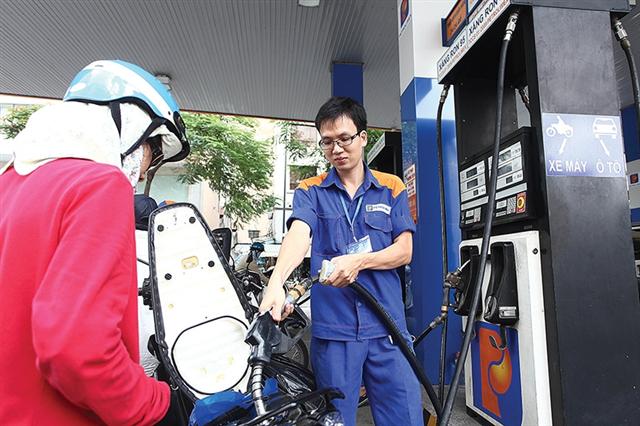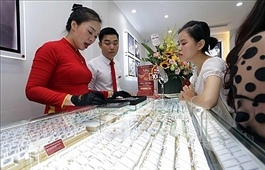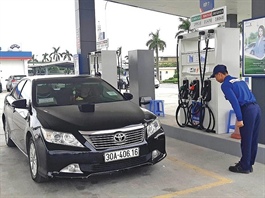Oil sector open on back of new eased FOL cap
Oil sector open on back of new eased FOL cap
Even if the latest proposal for international investors to be able to own up to 35 per cent of Vietnamese oil firms comes true, it may still not be smooth sailing for foreign groups to step up in the market.

The proposed 35 per cent FOL for petrol firms may not be enough to entice overseas investors, Photo: Le Toan
|
The Ministry of Industry and Trade (MoIT) has proposed the government to allow domestic petrol and oil businesses to transfer up to 35 per cent of stakes to foreign investors. This is part of the draft revision and supplementation of Decree No.83/2014/ND-CP dated 2014, creating favourable conditions for non-national investors to participate in petrol and oil distribution in Vietnam.
Frederick Burke, managing partner of Baker McKenzie Vietnam, told VIR that it is a good time for the state to sell some of its stakes in retail petroleum businesses. It could do so by selling new shares to raise new capital to improve the network, or it could just sell some of its existing shares in order to reduce its risk exposure to this volatile sector, or it could do a combination of the two. However, obstacles remain for either or both options.
“Perhaps the main factor that has discouraged foreign interest in petroleum retail distribution, currently subject to ownership restrictions, is the fact that prices are regulated in a way that profitability is very low,” he said. “These low-capped prices mean that it would be difficult to infuse enough new capital to invest in international-standard equipment for safety and environmental purposes.”
The road to market-price petrol is long and it is proving hard for the state to wean consumers off of this costly subsidy. With oil prices becoming depressed by global lockdowns, the pressure has been greatly reduced, making it a good time to relax the price cap and allow market forces to determine the price.
If it becomes more expensive, transport prices and the cost of goods could be impacted, and this may cause drivers to look at alternatives such as energy-efficient vehicles and even hydrogen vehicles in the future. To the extent that it makes retail businesses more viable financially, it will enable the state to realise a better return on its sale and transfer, according to Burke.
Another issue is the 35 per cent cap, which means that the overseas investor may be at the mercy of a majority investor. It would require detailed minority shareholder protections in the underlying company charter to mitigate this risk, which cannot be ruled out entirely.
“Also, in view of the changing liabilities under the proposed environmental law, investors would want to know what liability they might assume by joining into such a company by virtue of any contamination or pollution the stations have left behind,” Burke said.
Meanwhile, Samuel Son Tung Vu, lawyer at law firm Bae, Kim & Lee Vietnam, said that under 2013’s Circular No.34/2013/TT-BCT on roadmaps for goods trading of foreign-invested enterprises in Vietnam, such groups are not permitted to exercise rights to import, export, and distribute oil and petroleum products. However, there has been an inconsistency in the application of these regulations due to different merger procedures in the case of non-listed companies and listed companies.
In the case of non-listed companies, foreign investors are required to apply for approval from the planning and investment department where the target company is located pursuant to Article 26 of the Law on Investment. However, based on Circular 34, it is likely that the local department would reject such proposals.
As for listed companies, foreign investors can freely trade listed shares of companies such as Petrolimex and PVOil. Despite being key importers and distributors of oil and petroleum products, according to current data, Petrolimex and PVOil have 6.05 and 14.57 per cent shares held by overseas investors, respectively.
The current regulations result in different outcomes depending on the status of the target company, whether being a listed or non-listed company.
“The proposal by the MoIT to supplement Decree 83 opens a pathway for a target company and its foreign investor(s) to seek approval for equity transactions. However, the threshold of 35 per cent may not be attractive,” Vu said. “As the default foreign ownership limit (FOL) for listed companies is set at 49 per cent, it may be better if the MoIT raises the threshold to the same level. Under the mechanism proposed, the ministry maintains the right to approve each transaction. Therefore, it can prevent any hostile takeover situation.”
According to Vu, the government also aims to equitise state-owned enterprises in import and export, and distribution of oil and petroleum products, and to provide a higher threshold would make equitisation more attractive to foreign investors. The FOL should be sufficient to accommodate both strategic and financial investors and funds.
The representative of one foreign firm engaging in an oil and gas exploration joint venture in Vietnam told VIR that despite the relaxation of FOL in petroleum retail business, it is not easy because of administrative procedures. Also, he added, the market is clearly divided with advantages in favour of domestic enterprises.
























